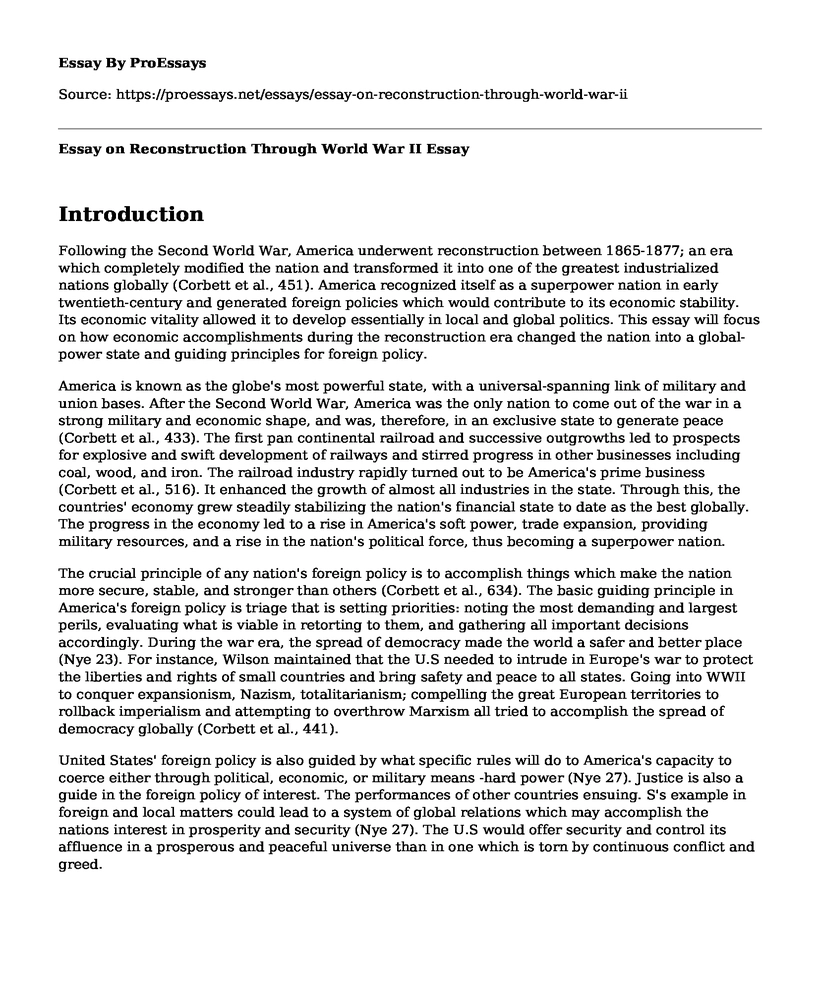Introduction
Following the Second World War, America underwent reconstruction between 1865-1877; an era which completely modified the nation and transformed it into one of the greatest industrialized nations globally (Corbett et al., 451). America recognized itself as a superpower nation in early twentieth-century and generated foreign policies which would contribute to its economic stability. Its economic vitality allowed it to develop essentially in local and global politics. This essay will focus on how economic accomplishments during the reconstruction era changed the nation into a global-power state and guiding principles for foreign policy.
America is known as the globe's most powerful state, with a universal-spanning link of military and union bases. After the Second World War, America was the only nation to come out of the war in a strong military and economic shape, and was, therefore, in an exclusive state to generate peace (Corbett et al., 433). The first pan continental railroad and successive outgrowths led to prospects for explosive and swift development of railways and stirred progress in other businesses including coal, wood, and iron. The railroad industry rapidly turned out to be America's prime business (Corbett et al., 516). It enhanced the growth of almost all industries in the state. Through this, the countries' economy grew steadily stabilizing the nation's financial state to date as the best globally. The progress in the economy led to a rise in America's soft power, trade expansion, providing military resources, and a rise in the nation's political force, thus becoming a superpower nation.
The crucial principle of any nation's foreign policy is to accomplish things which make the nation more secure, stable, and stronger than others (Corbett et al., 634). The basic guiding principle in America's foreign policy is triage that is setting priorities: noting the most demanding and largest perils, evaluating what is viable in retorting to them, and gathering all important decisions accordingly. During the war era, the spread of democracy made the world a safer and better place (Nye 23). For instance, Wilson maintained that the U.S needed to intrude in Europe's war to protect the liberties and rights of small countries and bring safety and peace to all states. Going into WWII to conquer expansionism, Nazism, totalitarianism; compelling the great European territories to rollback imperialism and attempting to overthrow Marxism all tried to accomplish the spread of democracy globally (Corbett et al., 441).
United States' foreign policy is also guided by what specific rules will do to America's capacity to coerce either through political, economic, or military means -hard power (Nye 27). Justice is also a guide in the foreign policy of interest. The performances of other countries ensuing. S's example in foreign and local matters could lead to a system of global relations which may accomplish the nations interest in prosperity and security (Nye 27). The U.S would offer security and control its affluence in a prosperous and peaceful universe than in one which is torn by continuous conflict and greed.
Conclusion
The United States' flashy economy was the main cause of all policy achievements. Financial prerequisites permitted the nation to come up with all facets of power. To date, America is the world's most essential and allied power state and will remain this way, unless President Trump goes ahead to remove the nation from its global commitments.
Works Cited
Corbett, P. Scott, et al. US History. OpenStax College, 2016.
Nye Jr, Joseph S. "Redefining the national interest." Foreign Affairs (1999): 22-35.
Cite this page
Essay on Reconstruction Through World War II. (2022, May 22). Retrieved from https://proessays.net/essays/essay-on-reconstruction-through-world-war-ii
If you are the original author of this essay and no longer wish to have it published on the ProEssays website, please click below to request its removal:
- Questions and Answers on World War I
- Paper Example on Martin Luther King: The Man Who Dreamed
- American History Questions and Answers Paper Example
- Ancient Greek Values in the Odyssey Essay
- Letter to W.E.B DuBois Paper Example
- The Aftermath of WWI: Development and Loss - Essay Sample
- Essay Example on Aesir-Vanir War: Ancient Conflict of Norse Deities







